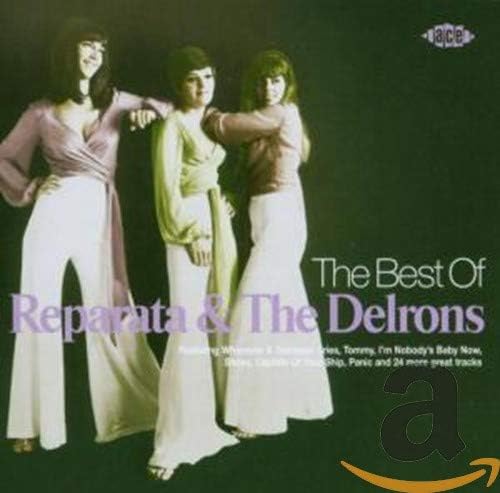Reparata & the Delrons

The Best of - Ace 2005
Tracks: 1. Boys and Girls / 2. Captain Of Your Ship / 3. Whenever A Teenager Cries / 4. Tommy / 5. The Kind Of Trouble That I Love / 6. It's Waiting There For You / 7. Panic / 8. Look In My Diary / 9. Do Wah Diddy / 10. I Have a Boyfriend / 11. I'm Nobody's Baby Now / 12. Take A Look Around You / 13. Mama's Little Girl / 14. I Can Hear The Rain / 15. The Boy I Love / 16. In My Diary / 17. He's My Guy / 18. Bye Bye Baby / 19. I Found My Place / 20. Loneliest Girl In Town / 21. I Can Tell / 22. Remember When / 23. Leave Us Alone / 24. He's The Greatest / 25. He Don't Want You / 26. Weather Forecast / 27. Hold The Night / 28. Saturday Night Didn't Happen / 29. Why Do Lovers Break Each Other's Heart? / 30. Shoes
Comments:
I came across the name "Reparata & the Delrons" somewhat by chance in connection with an article about American girl groups in the 1960s. The group was referred to there as one of the best in the genre and naturally I became curious about it.
A few checks on Youtube, where I came across titles like "Whenever a Teenager Cries" and "Captain of Your Ship", was enough to convince me that this was a group worth investing a little in.
It came to this compilation, which spans the years 1964 to 1969 and a single later recording from 1975.
The group was formed in 1962 and in its career underwent several line-up changes. However, the consistent member was Reparata (Mary Aiese), who also co-wrote several of the group's songs. After 1969, however, Lorraine Mazzola took over the role of "Reparata", when Mary Aiese (O'Leary) had got married and needed a break.
The group released only two albums, but a long streak of singles, some of which were released as Reparata solo releases.
The group made an early breakthrough in 1964 with the track "Whenever a Teenager Cries", which was also the title of the group's first album. This album appears a bit uneven and rushed, but still represented here with several good tracks like "Bye Bye Baby", "Do Wah Diddy Diddy", "I Have a Boyfriend" and "In My Diary".
Sound and production is very similar to The Shangri-Las and when the songs are otherwise good, Reparata & the Delrons” perfectly match Mary Weiss and company.
There are many good tracks and also some really nice ones. In addition to those mentioned, I would like to highlight Jeff Barry's "I'm Nobody's Baby Now" (from 1966 and probably my personal favorite), "Tommy" from 1965 - very ala The Shangri-Las, "Take a Look Around You" (1966 written by Mary Aiese and producer Bill Jeromos), "I Can Tell" (1966 written by Kornfeld/Duboff), "Leave us Alone" (Early 1964 track released as The Delrons) and "He Don't Want You" (1966 written by Aiese and Jerome).
On the later recordings, the style has become a little more mainstream with composers such as Kenny Young; not quite as exciting but still quite good.
The group's second album from 1970 is not represented here and from what I have been able to read, it is not as exciting as the first; but I guess I also will give this a chance at some point.
 Back to Band pages
Back to Band pages
|